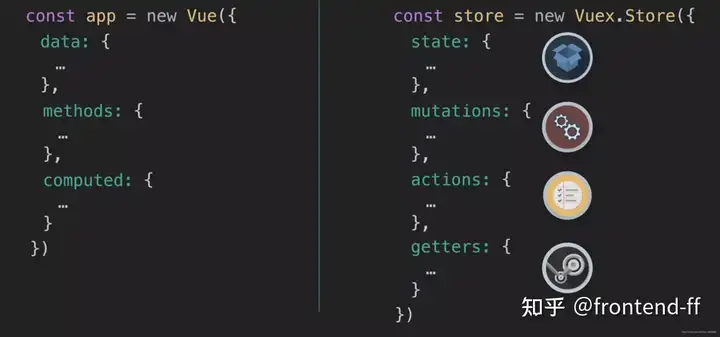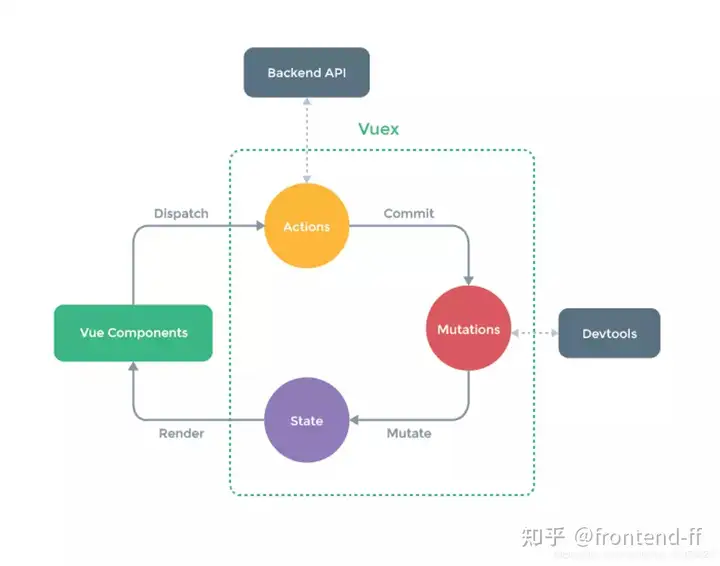vue是现阶段最盛行的后端架构众所周知,vuex则是两个状况命令行,全权负责vue中各第一类的状况变动并并行图形到网页上。
Vuex是甚么?
Vuex是专门针对为Vue服务项目,用作管理工作网页的统计数据状况、提供更多标准化统计数据操作方式的状况信息系统,相等于统计资料库mongoDB,MySQL等,或者说它的统计数据是储存在缓存中,网页创下即消亡。
难题思索
采用Vuex只需继续执行 Vue.use(Vuex),并在Vue的实用性中传至两个store对象的实例,store是怎样同时实现转化成的? state外部是怎样同时实现全力支持组件实用性和组件冗余的? 在继续执行dispatch促发action(commit反之亦然)的这时候,只需传至(type, payload),a
vue和vuex亲密关系
看呵呵那个vue积极响应式的范例,vue中的data 、methods、computed,能同时实现积极响应式。
快照透过点选该事件,促发methods中的increment方式,能更动state中count的值,除非count值出现变动,computed中的表达式能够把getCount预览到快照。
<div id=”app”>
<button @click=”increment”></button>
{{getcount}}
</app>
new Vue({
el: “#app”,
// state
data () {
return {
count: 0
}
},
// view
computed: {
getCount(){
return this.count
}
},
// actions
methods: {
increment () {
this.count++
}
},
})
所以vuex又和vue那个积极响应式的范例有甚么亲密关系呢?
快照透过点选该事件,促发mutations中方式,能更动state中的统计数据,除非state统计数据出现更动,getters把统计数据充分反映到快照。
所以actions,能理解处理异步,而单纯多加的一层。
既然提到了mutions actions这时候 就不得不提commit,dispatch这两个有甚么作用呢?
在vue范例中,透过click该事件,促发methods中的方式。当存在异步时,而在vuex中需要dispatch来促发actions中的方式,actions中的commit能促发mutations中的方式。并行,则直接在组件中commit促发vuex中mutations中的方式。
vuex同时实现
下面我们看下vuex中能像vue中同时实现改变状况,预览快照的功能:
Vuex.js
const store = new Vuex.Store({
state: {
count: 0
},
//state的值只能透过mutations来修改
mutations: {
increment(state) {
state.count++
}
},
//this.$store.commit(“increment”)促发mutations中表达式”increment”
actions: {
increment({commit}) {
commit(“increment”); //this.$store.commit(“increment”)
return state.count
}
}
})
export default store
App.vue
<template>
<div id=”app”>
<button @click=”increment”>增加</button>
<!– 有这时候不能直接 强制采用store里面的状况 this.$store.state.count –>
{{this.$store.getters.getCount}}
</div>
</template>
<script>
export default {
methods: {
increment(){
//this.$store.dispatch(“increment”)促发actions表达式”increment”
this.$store.dispatch(“increment”)
}
}
}
</script>
源码分析
现在我们已经了解vuex能同时实现和像vue双向统计数据绑定–预览试图的功能,下面我们重点说说vuex源码的同时实现:
store转化成组件install方式
vuex是透过vue插件机制将组件转化成的
首先采用vuex,需要安装插件:
Vue.use(Vuex); // vue的插件机制,安装vuex插件
当ues(Vuex)这时候,会调用vuex中的install方式,装在vuex! 下面时install的核心源码:
Vue.mixin({
beforeCreate() {
if (this.$options && this.$options.store) {
//找到根组件 main 上面挂两个$store
this.$store = this.$options.store
// console.log(this.$store);
} else {
//非根组件指向其父组件的$store
this.$store = this.$parent && this.$parent.$store
}
}
})
可见,store注入 vue的实例组件的方式,是透过vue的 mixin机制,借助vue组件的生命周期 钩子 beforeCreate 完成的。即 每个vue组件实例化过程中,会在 beforeCreate 钩子前调用 vuexInit 方式。
vuex中的统计数据双向绑定
this._s = new Vue({
data: {
// 只有data中的统计数据才是积极响应式
state: options.state
}
})
getters同时实现
//同时实现getters基本原理
let getters = options.getters || {}
// console.log(getters);
// this.getters = getters; //不是直接挂载到 getters上 这样只会拿到整个 表达式体
this.getters = {};
// console.log(Object.keys(getters)) // [“myAge”,”myName”]
Object.keys(getters).forEach((getterName) => {
// console.log(getterName) // myAge
// 将getterName 放到this.getters = {}中
// console.log(this.state);
Object.definePrs
get: () => {
return getters[getterName](this.state)
}
})
})
从上面源码,我们能看出Vuex的state状况是积极响应式,是借助vue的data是积极响应式,将state存入vue实例组件的data中;Vuex的getters则是借助vue的计算属性computed同时实现统计数据实时监听。
mutations同时实现
let mutations = options.mutations || {}
// console.log(mutations);
this.mutations = {};
Object.keys(mutations).forEach(mutationName=>{
// console.log(mutationName);
this.mutations[mutationName] = (payload) =>{
this.mutations[mutationName](this.state,payload)
}
})
actions同时实现
// actions的基本原理
let actions = options.actions || {}
this.actions = {};
forEach(actions,(actionName,value)=>{
this.actions[actionName] = (payload)=>{
value(this,payload)
}
})
commit dispatch的同时实现
commit(type,payload){
this.mutations[type](payload)
}
// type是actions的类型
dispatch=(type,payload)=>{
this.actions[type](payload)
}
小结
Vuex是透过全局转化成store第一类,ex未免有点大材小用,其实只用采用组件间常用的通信方式即可。











